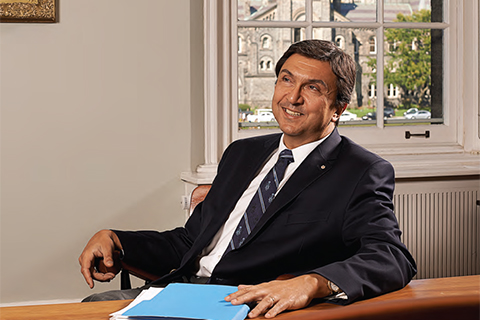Among the many visitors to the University of Toronto’s St. George campus recently were alumni who returned to Convocation Hall in June to celebrate the graduation of a son or daughter. While the landscape around Con Hall looks very different today, other changes at the university are less obvious but even more significant.
Students who earn a bachelor’s degree from U of T today are entering the workforce or preparing for the next stage of their academic career under vastly different conditions from even a decade ago. To succeed in the new global knowledge economy, today’s graduates must be creative thinkers. They must be prepared to work collaboratively with people from other cultures and other countries, draw on knowledge outside of their area of expertise and devise completely new ways of approaching the world’s most pressing problems.
U of T’s undergraduate degree has evolved in response to these challenges. Our vast research enterprise offers students unique academic opportunities. For example, U of T is one of the few universities in Canada that encourages undergraduates to pursue their own research projects, often under the guidance of a faculty member who is a leading expert in the field. In this way, students share in the excitement of acquiring new knowledge while developing relationships with faculty members who will act as mentors throughout their academic careers.
Of course, most undergrads will not go on to become researchers themselves, but at U of T our goal is to help them think independently, like their research mentors. Ideally, they’ll learn how to identify a promising new avenue of inquiry and follow it to a successful conclusion. We also want students to become disciplined in their thinking so they can determine the best ideas to pursue, regardless of whether their field is filmmaking, marketing or cellular biology. Canada needs such graduates if our nation is to prosper in the decades ahead.
U of T’s program breadth also offers students distinct advantages. Our undergraduates can study a huge range of subjects – more than at any other university in Canada. In all, U of T undergrads can mix and match courses from about 600 programs, from aboriginal to women’s studies. According to the Faculty of Arts and Science, 30 per cent of 2008 grads pursued two or more programs in different disciplines. Students themselves clearly recognize the importance of obtaining a broad education as they prepare for careers in an increasingly global economy.
Rapid technological change requires the university to frequently update its programs, and occasionally create new ones in emerging fields. Last year, for example, the faculties of Forestry and Arts and Science launched a joint undergraduate major in Forest Biomaterials Science. This innovative program combines courses from forestry, chemistry, biology, commerce, engineering and architecture. In it, students learn how scientists develop new energy sources and new products from biological material. Forest Biomaterials students also have the opportunity to work with an industrial partner to conduct original research related directly to their field. Similar industry placements and internships are available in a growing number of U of T’s undergraduate programs.
Once considered a frill, international study, work or research experience has increasingly become a requirement for today’s students who want to compete internationally for the best careers. The buzzword (or one of them) in post-secondary education circles these days is “global competence.” Yet few Canadian universities have U of T’s global reach (see “A World of Opportunity” on page 40). At the same time, U of T’s student population is the most diverse in the country, so even students who don’t take a semester to study or work abroad will gain from a learning environment that brings together many different cultures and languages.
Canada’s future prosperity rests on our citizens’ ability to devise solutions to the world’s problems. Research is one engine of innovation, but nurturing talent is still the most important aspect of what your university does. That’s why we’re dedicated to teaching today’s young people the creative and collaborative skills they will need to become tomorrow’s leaders.







No Responses to “ U of T’s Unique Advantages ”
At lunch I sat down to read U of T Magazine, but got no further than the President's Message.
In it he says, "In this way, students share in the excitement of acquiring new knowledge while developing relationships..."
It was the "acquiring new knowledge" that stopped me.
The word "acquiring" implies that "new knowledge" is out there just waiting to be plucked from somewhere. I know President Naylor knows that this isn't so. I know he understands the difference between "information" and "knowledge" — the former does exist already formed, the latter is what happens when our brains sort through large amounts of information and create something not previously seen or understood. We "acquire" information; we "construct" knowledge.
Why do I make an issue of something so small? Because the way we talk about something matters — it reflects our underlying assumptions about the world. To speak (or write) of knowledge as "acquired" demeans the powerful processes by which our brains make sense of an ever changing world.
President Naylor may want to extoll the program breadth, and cultural diversity of U of T currently, but it's crucial to understand that knowledge is something each individual person on the campus must create for her or himself.
Judith Newman
PhD 1976 OISE
Halifax